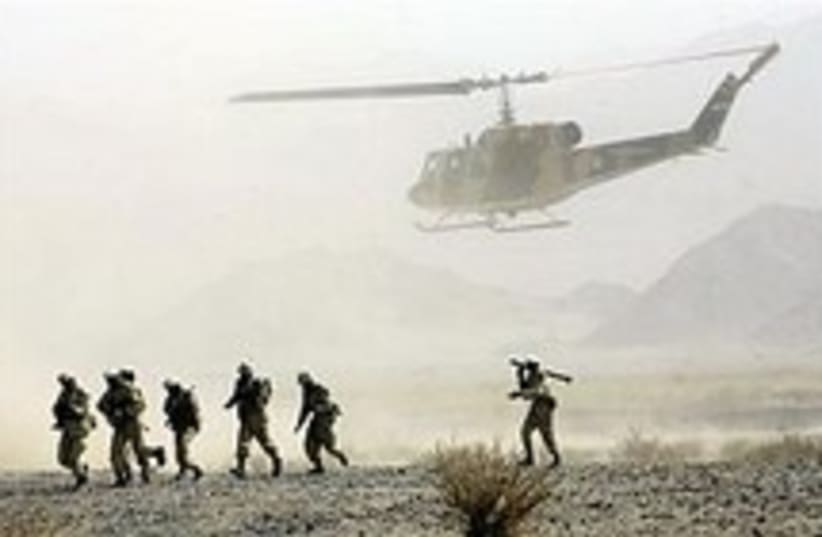France, Gulf states begin war games
Countries deny link between timing of military drills in Straits of Hurmuz and Iran standoff.
By RACHELLE KLIGER, THE MEDIA LINE NEWS AGENCY
France, Qatar and the United Arab Emirates have begun joint military drills in the shadow of the crisis over neighboring Iran's nuclear program.
The war games began on Monday and will continue until March 5.
French and UAE officials are denying a link between the timing of these exercises and the stand off with Iran, explaining these drills were planned a year in advance.
However, the war games will likely put France and the Gulf nations in a better state of preparedness for any future confrontation with Iran.
The maneuvers are not extraordinary, as the French navy's presence in the Gulf has become routine in recent years and there is no direct connection to the crisis with Iran, said Dr. Géraud Poumarède, director of history studies at the Paris-Sorbonne University Abu Dhabi.
"It's not against Iran," he said. "It's more a demonstration of friendship of the strong relationship between France, Qatar and the UAE."
The war games involve land, sea and air forces and are taking place in UAE territory and in international waters near the Straits of Hurmuz.
Iran, Qatar and the UAE all have coastlines on the Gulf. Any future standoff there would likely affect energy supplies from these oil-rich states to the rest of the world.
"Maybe two thirds of the oil supply goes through this region all over the world, east and west," said Musa Qallab, the GCC defense program manager at the Dubai-based Gulf Research Center.
France has had strong defense relations with GCC countries for a long time and has equipped and trained several armies in this region.
The strategic location of the Hurmuz straits is a factor to reckon with, and since so many countries have forces based in the Gulf, it is only natural that they be involved in training and coordination maneuvers with their GCC partners, Qallab said.
The commercial assets, such as strategic waterways for oil, are partly what have prompted the large military presence in this region.
This military presence is connected to regional threats such as terrorism, natural disasters and Iran, but Qallab does not see in these maneuvers a preparation for an imminent war against Iran.
Gulf states are reluctant to engage in a military standoff with Iran and favor a peaceful solution to the crisis. Muslim Sunni countries do not want to see a powerful Shi'ite regime hold sway in the region.
Gulf states also have safety concerns about Iran's nuclear facilities. The nuclear reactor in Bushehr, for example, is closer to Bahrain than it is to the Iranian capital Teheran.
Recent reports suggest the six members of the Gulf Cooperation Council are planning to establish a joint military force. Bahrain, Kuwait, Oman, Qatar, Saudi Arabia, and the United Arab Emirates are planning the joint force as a means to reinforce ties among the Gulf countries and perhaps create a stronger force to confront potential threats from Iran.
The US has strong strategic alliances in the oil-rich Gulf, as these countries are supporting the US in the war against terror.
During French President Nicolas Sarkozy's trip to the Gulf last month, Paris signed an agreement with the UAE to station its first military installation in the Gulf.
France is playing a key role in diplomacy with regard to Iran's nuclear program. Iran has been under international pressure since 2002 to abandon the program for fear that it is covertly manufacturing nuclear weapons.
Teheran denies these allegations and insists the program is for the peaceful purposes of producing energy. Iran maintains it has a right to continue its nuclear-related activities, including uranium enrichment that can be applied for both civilian and military nuclear use.
The five permanent members of the United Nations Security Council - the US, the UK, China, France and Russia met in Washington on Monday to discuss a possible third set of sanctions on Iran.
The United States has not ruled out military action against Iran's nuclear facilities.
Analysts say Washington is not likely to open a military front in Iran during the year of a presidential election, and especially when US forces are heavily tied down in Iraq.
The International Atomic Energy Agency (IAEA) received a report on Monday saying Iran may have continued secret work on a nuclear weapon after 2003.
The report, which the British ambassador to the IAEA said was based on multiple sources, contradicts the findings of the US National Intelligence Estimate released in December that said Iran had stopped atomic weapons activity five years ago.
The Iranian representative to the IAEA rejected the new report and dismissed the new documents as forgeries.
if(catID != 151){
var cont = `Take Israel home with the new
Jerusalem Post Store
Shop now >>
`;
document.getElementById("linkPremium").innerHTML = cont;
var divWithLink = document.getElementById("premium-link");
if(divWithLink !== null && divWithLink !== 'undefined')
{
divWithLink.style.border = "solid 1px #cb0f3e";
divWithLink.style.textAlign = "center";
divWithLink.style.marginBottom = "40px";
divWithLink.style.marginTop = "40px";
divWithLink.style.width = "728px";
divWithLink.style.backgroundColor = "#3c4860";
divWithLink.style.color = "#ffffff";
}
}
(function (v, i){
});

